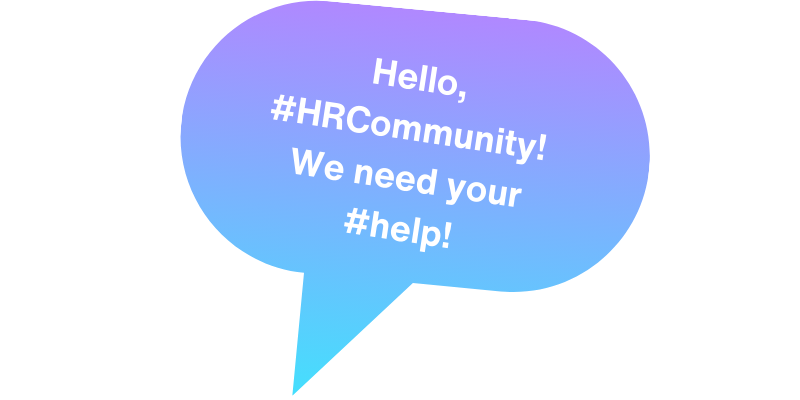HR BYTES NEWSLETTER
November 2023
HR Bytes Beyond Borders
Global HR News
Generative AI will ‘no doubt’ affect all jobs — including HR
All jobs posted on Indeed — from truck driver to software engineer — have skills that can be done or augmented by generative artificial intelligence, the hiring platform said Sept. 21. However, only 1 in 5 is considered “highly exposed” to the technology, meaning generative AI considers itself “good” or “excellent” at performing 80% or more of the skills listed in a job posting, the firm said. Human resources jobs were near the high end of exposure, with generative AI considering itself “good” at most of the department’s tasks.
Season of Giving Contest through Nov 30, 2023!
three winners of the drawing Will Get to PICK A CHARITY to which HR GECKOS will MAKE A donatION!
The rules are simple!
Step 1: Rate and review the HR Bytes Podcast on Spotify. Of course, we appreciate 5-star reviews, but they aren't required.
Step 2: Take a screenshot of your review and send it to us via email: [info [at] hrgeckos dot com].
Bonus Step 3: Share your review or a link to our show on your social networks. We hope to see you win big!

The winners will be announced in the December 2023 Newsletter!

Hollywood execs agree to restriction on AI use
Hollywood executives and the Writers Guild Association have reached an agreement that addresses concerns about the use of generative AI in the entertainment industry. The deal, which lasts until May 2026, specifies that AI cannot create or modify written material, and content produced by AI can't be considered source material. While writers can use AI if their company allows it, they can't be forced to use AI tools like ChatGPT. Additionally, using writers' work to train AI is considered a violation of the agreement.
Over 80% of enterprises will utilize Generative AI APIs or incorporate Generative AI into applications by 2026
By 2026, Gartner predicts that over 80% of businesses will have harnessed the power of generative artificial intelligence (GenAI) through APIs or applications. This marks a significant jump from the less than 5% using GenAI in 2023. GenAI is gaining momentum, especially in sectors like healthcare, life sciences, law, finance, and the public sector.

Australia needs better AI regulation, says Human Rights Commission
AI is becoming more and more powerful and common in our workplaces and lives, and it is important to make sure that it is used in a responsible and ethical way. The Australian Human Rights Commission (AHRC) has made a number of recommendations to the government on how to do this, including:
-
Stronger privacy and data protection laws.
-
Safeguards to protect users from harmful AI chatbots.
-
Clearer requirements for organizations to report misinformation and disinformation.
-
More investment in education and training on AI safety and limitations.
-
Environmental impact reporting for organizations.
Canada: Workplaces Should Consider Bias, Privacy in AI Policies
Canadian employers are increasingly using artificial intelligence (AI) for hiring decisions. It's convenient, but legal experts warn there are potential issues. SHRM suggests that Canadian employers carefully think about both the benefits and problems that come with using AI in hiring. Automated hiring tools are now crucial and can operate with varying levels of human involvement.

HR Bytes Across the States
Exploring National and Local HR News
California law gives workers 5 days of leave for reproductive loss
California has a new law granting employees five days of leave for "reproductive loss," effective from January 1. This leave covers situations like miscarriage and failed adoption. It's available to public and private employers with at least five workers. Workers can use these days within three months, and they don't need to provide documentation. Employers are encouraged to update policies and educate employees on this new leave option.
As NYC restricts AI in hiring, next steps remain cloudy
New York City’s law restricting the use of artificial intelligence tools in the hiring process goes into effect at the beginning of next year. While the law is seen as a bellwether for protecting job applicants against bias, little is known to date about how employers or vendors need to comply, and that has raised concerns about whether the law is the right path forward for addressing bias in hiring algorithms.

HR Bytes Community corner
Share your HR tips and tricks
In the ever-evolving field of HR, using Artificial Intelligence (AI) has become a game-changer. AI can streamline processes, provide insights, and improve decision-making. However, harnessing the power of AI effectively requires a strategic approach.
Here are some tips and tricks to help HR professionals navigate AI.
Align AI with HR Objectives:
Ensure your AI initiatives align with HR goals such as talent acquisition, employee retention, and employee experience.
Start with Data Quality:
AI relies on data. Begin by cleaning and organizing your HR data to ensure it's accurate and up-to-date.
Define Clear Objectives:
Specify what you want to achieve with AI, whether it's faster recruitment, predictive analytics, or improving employee engagement.
Choose the Right AI Tools:
Select AI solutions that match your HR needs. Tools can range from chatbots for employee self-service to AI-driven analytics platforms.
Ethical AI Usage:
Implement AI ethically by avoiding algorithm bias and ensuring transparency in decision-making processes.
Employee Data Privacy:
Prioritize the protection of employee data. Adhere to data privacy regulations and communicate data usage policies.
Continuous Learning:
Stay updated on AI trends and best practices. Attend AI-related webinars, workshops, and courses to enhance your knowledge.
Integration Capabilities:
Opt for AI tools that can seamlessly integrate with your existing HR systems. Integration reduces data silos and enhances efficiency.
Employee Training:
Provide training to HR staff on AI tools' usage. Familiarity and competence among your team are crucial for success.
Avoid Over-Automation:
While AI can automate tasks, avoid over-automation. Maintain a human touch, especially in sensitive HR matters.
Security Measures:
Implement robust cybersecurity measures to protect AI applications and sensitive HR data.
Evaluate Vendor Reputation:
When selecting AI vendors, consider their reputation, customer reviews, and track record.
Transparency in Decision-Making:
AI-driven decisions should be transparent. Employees should understand why certain decisions are made by AI.
Feedback for Improvement:
Encourage employees to provide feedback on their experience with AI tools, and use this feedback to enhance AI applications.
What would you add to the above?
Do write to us at info [at] hrgeckos dot com or chime in on Social.

HR Bytes Digest
Must-Read HR Tech Articles
As HR meets AI, 4 steps to avoid legal headaches
There are no federal regulations in the U.S. that expressly govern the use of AI in the workplace (yet), but the U.S. Equal Employment Opportunity Commission has published guidance to remind employers that existing anti-discriminatory laws cover AI, including Title VII and the Americans with Disabilities Act.
HR professionals should be aware of potential legal issues when implementing AI tools in their processes. Employment attorneys suggest four essential steps to avoid AI-related legal complications:
To avoid legal issues when using AI in HR, follow these key steps.
-
Understand how AI tools work, their data sources, and qualification definitions.
-
Don't rely solely on claims of "bias-free" tools; they could still result in discrimination lawsuits.
-
Regularly monitor and validate AI-generated results to detect and address biases.
-
Always involve a human in decision-making processes for accountability.
Generative AI Will Power a New HR Talent Intelligence Paradigm
A new study by The Josh Bersin Company emphasizes the potential of Generative AI, like ChatGPT, to enhance HR practices, but it reveals that organizations need to overcome their fears of this technology. The research involved discussions with AI-aware executives, engineers, and product leaders, along with global HR leaders. It uncovered gaps in confidence and understanding of AI's potential for HR and talent management. HR leaders expressed apprehension about AI's role and its effective utilization for HR and talent-related purposes.
Check out previous editions of our Newsletter and follow us on Social!
Top 5 Priorities for HR Leaders in 2024
In 2024, HR leaders are focusing on five key priorities, according to a survey by Gartner. Their top concerns include leader and manager development, organizational culture, HR technology, change management, and career management/internal mobility. However, many face challenges as their HR technology strategies often don't align with their business needs, leading to uncertainty about adopting new technologies, such as AI.
Crafting a Generative AI Policy
In the ever-evolving world of AI, businesses are recognizing the importance of setting clear guidelines, as highlighted in AIHR's recent article. The article sheds light on the rapid adoption of generative AI, such as OpenAI's ChatGPT, in enterprise workflows. These AI systems are changing the way we work, aiding in content creation, customer support, data analysis, and more. While they enhance productivity, concerns about content accuracy and data privacy persist. To address these challenges, organizations are crafting generative AI policies, ensuring responsible AI use.

What’s one #HRTech topic you’d like to learn more about?
What #worktech initiatives have been working for you over the past year?
HR Bytes Podcast and Newsletter seeks contributors for our byte-sized Work Tech insights. If you’d like to write short blurbs on #HRTech #FutureofWork and related topics, please email us at info [at] hrgeckos dot com or connect on Social. Thank you!
Virtual Reality, Real Business: The Impact Of The Metaverse On Companies
This latest article by Forbes discusses the metaverse, a trending concept in the digital world. It explores how it's becoming a crucial part of the business landscape. The metaverse is seen as the next step in the internet's evolution, offering immersive and interconnected digital spaces for various activities. The article highlights its potential impact on marketing, industry, and the workplace. In essence, it emphasizes that businesses should pay attention to the metaverse's development as it represents a significant shift in how we interact and work online.

AI Won’t Replace Humans - But Humans With AI Will Replace Humans Without AI
This article explains that AI won't replace humans but will enhance their abilities. It's like how the internet made sharing information easier. AI, according to Harvard Business School professor Karim Lakhani, will make thinking more efficient. As people expect companies to use AI for better experiences, leaders should learn to use AI effectively in their businesses. "The New World of Work" series explores how top executives are preparing for the future. In simple terms, this article stresses the importance of AI for businesses and how it can improve our work.
Generative AI will transform three key HR roles
Generative AI (GAI) is reshaping HR roles, including HR business partners (HRBPs), learning and development (L&D) specialists, and total rewards leaders. Although GAI may not lead to job reductions, HR professionals using it will be in high demand. Mercer's survey indicates that 58% of employers plan to adopt GAI in HR by June 2024.
Beyond efficiency, GAI fosters innovation, complex problem-solving, and high-quality work by democratizing knowledge and creativity. Organizations can enhance human capabilities and elevate their teams' performance by redesigning HR processes and leveraging AI-based tools.
-
Armed with the right technology, HRBPs can free up more time to spend on high-value work.
-
In the new world of AI, the L&D professional becomes a learning consultant who creates and delivers content to extract the most value from AI.
-
Total Rewards professionals have an opportunity to pivot toward more high-value insights- and storytelling-based work.

Join the HR Bytes Community to share, learn, and grow!
Look for us on LinkedIn and Facebook (search for HR Bytes in Groups).

Geckos’ Ear Candy
HR Podcast Recommendations

We are listening to the HR Happy Hour podcast with Steve Boese and Trish Steed this month. This is the perfect podcast if you are interested in a wide range of topics, including Human Resources, management, leadership, and workforce technology.

And, of course, we are excited for our very own HR Bytes, where we bring stories of HR trailblazers who are redefining HR with a global mindset and local impact. Check out our latest conversation with Stela Lupushor of reframeWork.io.

Geckos’ Top Tails
HR Bookshelf Selections
A few new reads we found to stay on top of the latest trends in HR and the future of work.

Irresistible: The Seven Secrets of the World's Most Enduring, Employee-Focused Organization by Josh Bersin (February 16, 2023)

HR Unleashed!!: Developing the Differences That Make a Difference Kindle Edition by Steve Browne (May 9, 2023)

Human Resources Management, Global Edition, 17th edition Published by Gary Dessler (June 20, 2023)

Artificial Intelligence for HR: Use AI to Support and Develop a Successful Workforce by Ben Eubanks (January 25, 2022)
We want to extend a warm welcome to a new blog from the lens of a Chief People Officer, The Diary of a CPO, by Christine Song, CPO at Knix. Welcome, Christine!

HR Bytes Reminders
Mark Your Dates with HR Excellence
It’s time to change the clocks and plan for the Annual Holiday Party!
Native American Heritage Month (November 1 to 30) is designated as Native American Heritage Month, recognizing the rich history, culture, and contributions of Native Americans.
Remind employees to use any remaining balances in their health FSAs, HRAs, and dependent care FSAs before the end of 2023 to avoid forfeiting unused funds. Remind to send receipts.
Conduct year-end payroll processing and prepare for W-2 distribution. Start by verifying that all employee records, including personal and tax information, are accurate and up to date.
Review employee PTO balances and send push notifications of year-end policy, which may include limits on carrying over unused PTO.
Tuesday, December 5, 2023, is the closing date for submitting and certifying your 2022 EEO-1 Component 1 report(s). To meet this deadline, it's highly recommended by the EEOC to begin the filing process as early as possible.

A Tale of Me, Myself, and I!
An HRIS Analyst walks into the office…that could be a bar joke, too! *but here’s a tale of pure terror!
First day on the job, said Analyst (let’s call him Me, Myself, and I) learned the HR director quit without notice.
Now, if that doesn’t send your spine tingling, read on.
A week later, the TA manager put in their notice as well. That left Me, Myself, and I, and a newly promoted HR manager to deal with an HRIS implementation going live in a month!
*Nightmare, you say, but wait, there’s more!
Add to this open enrollment for a brand new benefits plan.
But wait, it gets more terrifying!
The new benefits plan and a brand new PTO plan had the same start dates as the go-live date for the HRIS
Me, Myself, and I turned into a wild multi-armed thing (think Demogorgon-like), juggling and trying to clean up a variety of complex messes while trying to adapt and fit into the new organization (*Run, we say!). Finally, about 8 months later, with no support they flew the coop, just like the “wild winged dove” (yes, that Stevie Nicks one)!
Note: We have some real questions, “where is HR?!”

A Tale of Times Immortal!
HR folks losing sleep is not uncommon <ahem; that’s not lore!> but when time plays tricks, they are left holding the pumpkins when the clock strikes 12!
The HR Warriors <hat tip> on this HR team concluded they had enough time in their waking hours and hit the Upgrade button, taking their timekeeping system from v1.0 to v2.0.
OK, that was brave indeed! But boy, oh boy, did they get more than they bargained for!
On the go-live, the time clocks went rogue, leaving 700 employees in limbo! But everything worked in the testing environs. <Hmm, sinister, what can go wrong after testing, right?>
Talk about sleepless nights
So ensued an “all hands on deck,” the likes of which weren’t seen in lands far and near! The missing clocks that employees waited ceaselessly to clock in/out took their time to be found! Finally, after a sleepless week, the team emerged victorious to tell the tale of Times Immortal!
Note: Heed our warning and keep an eye on those clocks! Tis the season of time changes!

A Tale of the Juggler, Sorcerer, and Wizard!
Listen up, folks! Here's a spine-tingling HR yarn that'll have you on the edge of your seat. It's a tale of the Juggler, Sorcerer, and Wizard, all rolled into one.
The client of this HR Consultant was juggling 10 different payroll systems for each country in which they had an operational presence.
Yes, you read that right! A whopping 10 <bewitching systems>!
It was chaotic <just chaotic?> to pull data from 10 systems for any leadership reporting or analytics <or just being useful - garbage in, garbage out>. In the case of international transfers, the business process was a pain <give us pain and we’ll show you gain, said no one!>.
Can you imagine? Herding cats may be easier! <no offense to our feline friends>
But then, like a wizard out of nowhere, our HR expert waved his magic wand and conjured a solution that could make even the witchiest of HR woes disappear.
Note: Hire that juggler, wizard, and sorcerer right away. Every team needs one!







